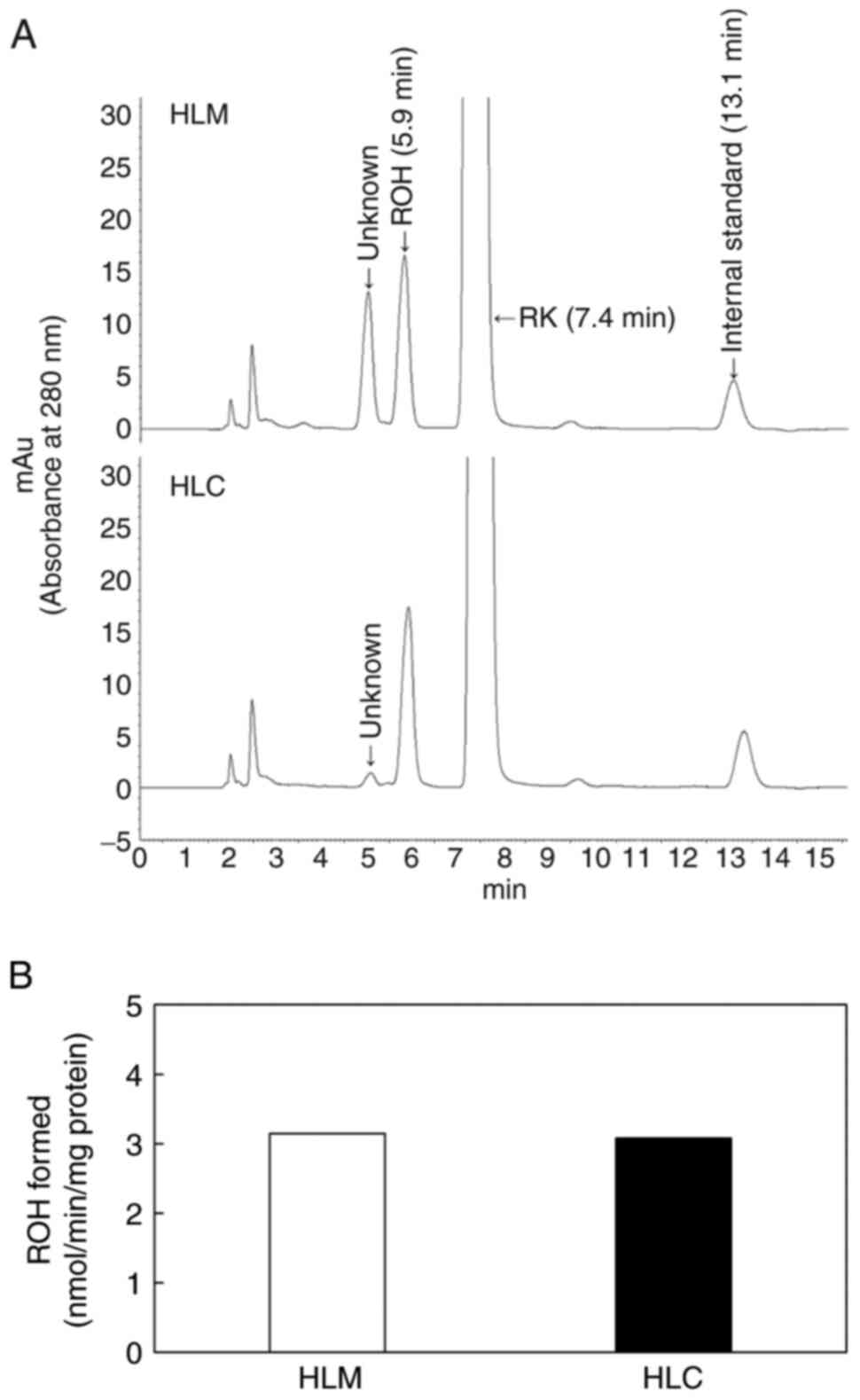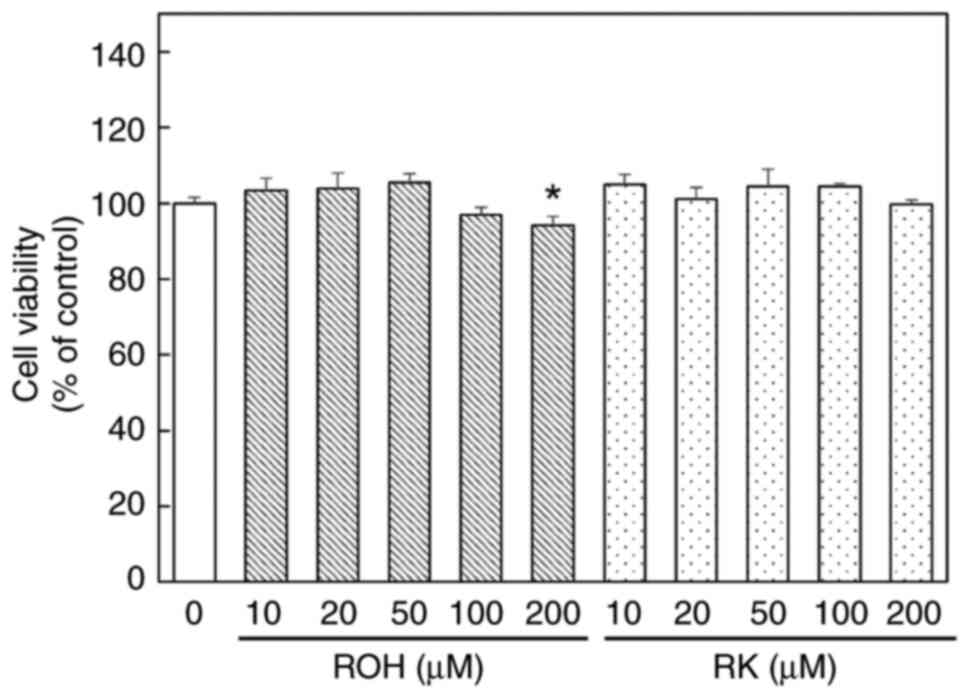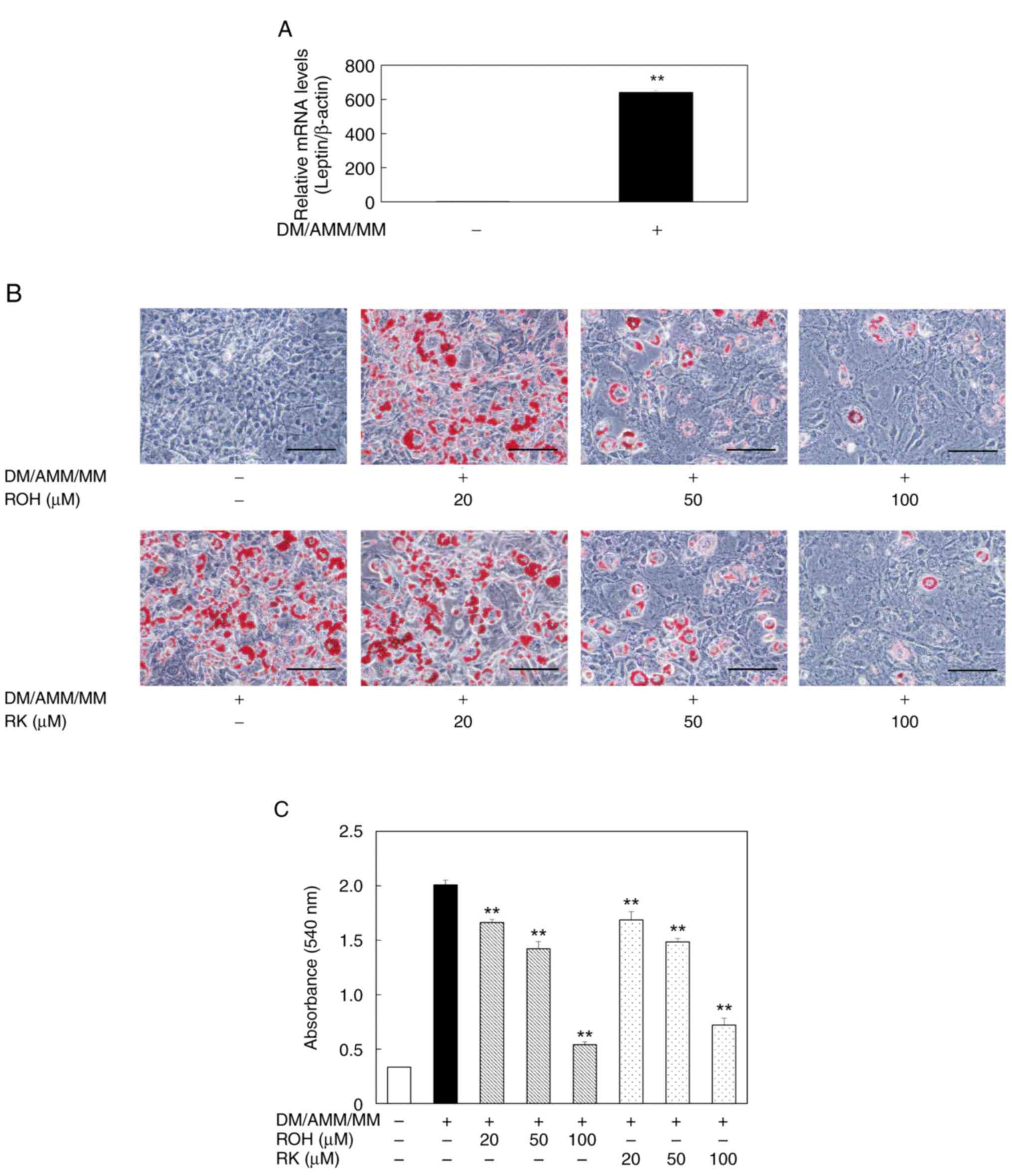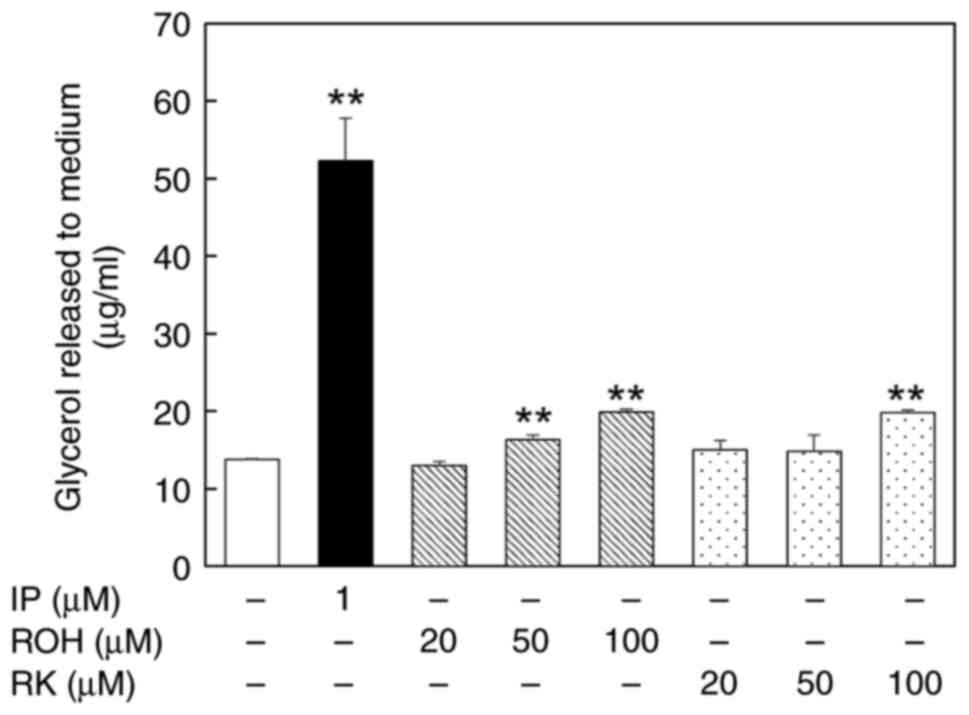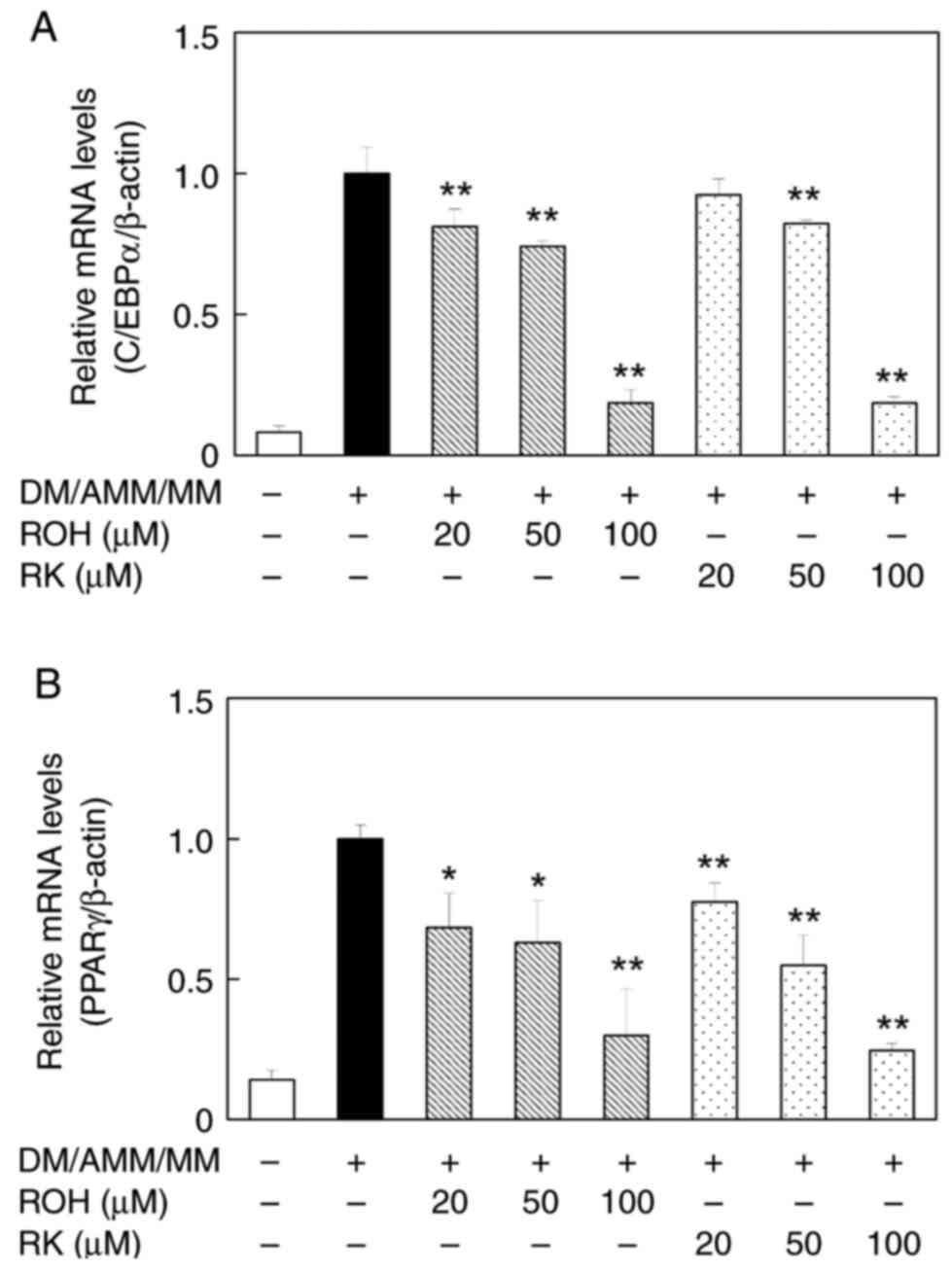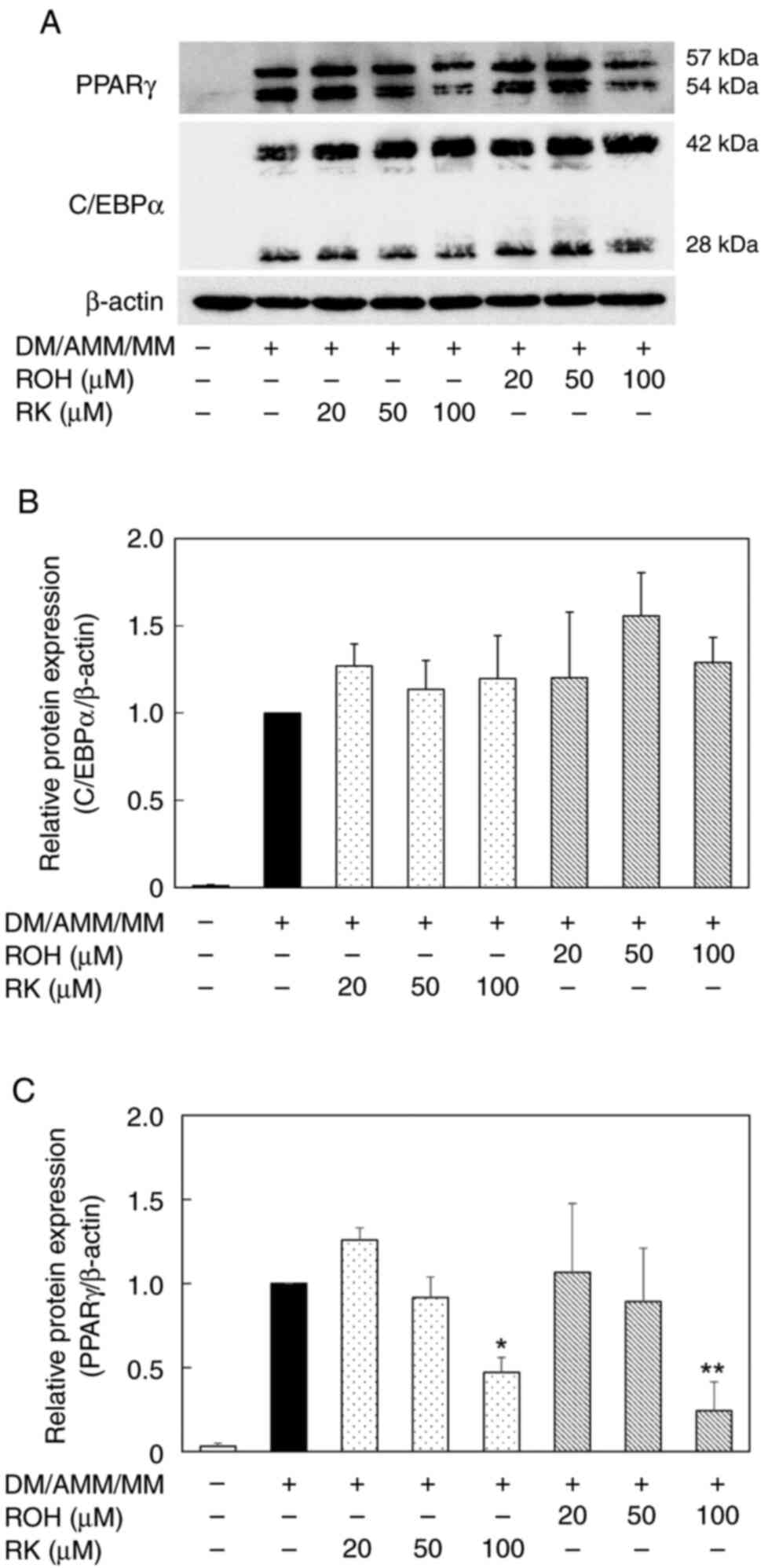|
1
|
Ding J, Reynolds LM, Zeller T, Müller C,
Lohman K, Nicklas BJ, Kritchevsky SB, Huang Z, de la Fuente A,
Soranzo N, et al: Alterations of a cellular cholesterol metabolism
network are a molecular feature of obesity-related type 2 diabetes
and cardiovascular disease. Diabetes. 64:3464–3474. 2015.
View Article : Google Scholar : PubMed/NCBI
|
|
2
|
Kopelman PG: Obesity as a medical problem.
Nature. 404:635–643. 2000. View
Article : Google Scholar : PubMed/NCBI
|
|
3
|
Garg SK, Maurer H, Reed K and Selagamsetty
R: Diabetes and cancer: Two diseases with obesity as a common risk
factor. Diabetes Obes Metab. 16:97–110. 2014. View Article : Google Scholar : PubMed/NCBI
|
|
4
|
Cao Z, Umek RM and McKnight SL: Regulated
expression of three C/EBP isoforms during adipose conversion of
3T3-L1 cells. Genes Dev. 5:1538–1552. 1991. View Article : Google Scholar : PubMed/NCBI
|
|
5
|
Farmer SR: Transcriptional control of
adipocyte formation. Cell Metab. 4:263–273. 2006. View Article : Google Scholar : PubMed/NCBI
|
|
6
|
Morrison S and McGee SL: 3T3-L1 adipocytes
display phenotypic characteristics of multiple adipocyte lineages.
Adipocyte. 4:295–302. 2015. View Article : Google Scholar : PubMed/NCBI
|
|
7
|
Kim EJ, Kang MJ, Seo YB, Nam SW and Kim
GD: Acer okamotoanum Nakai leaf extract inhibits adipogenesis via
suppressing expression of PPAR γ and C/EBP α in 3T3-L1 cells. J
Microbiol Biotechnol. 28:1645–1653. 2018. View Article : Google Scholar : PubMed/NCBI
|
|
8
|
Lee MS, Kim CT, Kim IH and Kim Y:
Inhibitory effects of green tea catechin on the lipid accumulation
in 3T3-L1 adipocytes. Phytother Res. 23:1088–1091. 2009. View Article : Google Scholar : PubMed/NCBI
|
|
9
|
Gallois A: Quantitative evaluation of
raspberry ketone using thin-layer chromatography. Sci Aliments.
2:99–106. 1982.
|
|
10
|
Larsen M, Poll L, Callesen O and Lewis M:
Relations between the content of aroma compounds and the sensory
evaluation of 10 raspberry varieties (Rubus idaeus L). Acta Agric
Scand. 41:447–454. 1991. View Article : Google Scholar
|
|
11
|
Mehanna ET, Barakat BM, El Sayed MH and
Tawfik MK: An optimized dose of raspberry ketone controls
hyperlipidemia and insulin resistance in male obese rats; Effect on
adipose tissue expression of adipocytokines and aquaporin 7. Eur J
Pharmacol. 832:81–89. 2018. View Article : Google Scholar : PubMed/NCBI
|
|
12
|
Wang L, Meng X and Zhang F: Raspberry
ketone protects rats fed high-fat diets against nonalcoholic
steatohepatitis. J Med Food. 15:495–503. 2012. View Article : Google Scholar : PubMed/NCBI
|
|
13
|
Morimoto C, Satoh Y, Hara M, Inoue S,
Tsujita T and Okuda H: Anti-obese action of raspberry ketone. Life
Sci. 77:194–204. 2005. View Article : Google Scholar : PubMed/NCBI
|
|
14
|
Fuchino H, Konishi S, Satoh T, Yagi A,
Saitsu K, Tatsumi T and Tanaka N: Chemical evaluation of Betula
species in Japan. II. Constituents of Betula platyphylla var
japonica. Chem Pharm Bull. 44:1033–1038. 1996. View Article : Google Scholar
|
|
15
|
Inoue T, Ishidate Y, Fujita M, Kubo M,
Fukushima M and Nagai M: Studies on the constituents of Aceraceae
plants. I. Constituents in the leaves and the stem bark of Acer
nikoense Maxim (author's transl). Yakugaku Zasshi. 98:41–46.
1978.(In Japanese). View Article : Google Scholar : PubMed/NCBI
|
|
16
|
Li X, Wei T, Wu M, Chen F, Zhang P, Deng
ZY and Luo T: Potential metabolic activities of raspberry ketone. J
Food Biochem. 46:e140182022.PubMed/NCBI
|
|
17
|
Sporstøl S and Scheline RR: The metabolism
of 4-(4-hydroxyphenyl)butan-2-one (raspberry ketone) in rats,
guinea-pigs and rabbits. Xenobiotica. 12:249–257. 1982. View Article : Google Scholar : PubMed/NCBI
|
|
18
|
Tanaka Y, Nishikawa Y, Matsuda K, Yamazaki
M and Hayashi R: Purification and some properties of ketone
reductase forming an active metabolite of sodium
2-[4-(2-oxocyclopentylmethyl)-phenyl]propionate dihydrate
(loxoprofen sodium), a new anti-inflammatory agent, in rabbit liver
cytosol. Chem Pharm Bull (Tokyo). 32:1040–1048. 1984. View Article : Google Scholar : PubMed/NCBI
|
|
19
|
Sasaki K, Yamauchi K and Kuwano S:
Metabolic activation of sennoside A in mice. Planta Med.
37:370–378. 1979. View Article : Google Scholar : PubMed/NCBI
|
|
20
|
Murata H, Higuchi T and Otagiri M: Oral
pharmacokinetics and in-vitro metabolism of metyrapone in male
rats. J Pharm Pharmacol. 68:970–979. 2016. View Article : Google Scholar : PubMed/NCBI
|
|
21
|
Imamura Y, Iwamoto K, Yanachi Y, Higuchi T
and Otagiri M: Postnatal development, sex-related difference and
hormonal regulation of acetohexamide reductase activities in rat
liver and kidney. J Pharmacol Exp Ther. 264:166–171.
1993.PubMed/NCBI
|
|
22
|
Higuchi T, Imamura Y and Otagiri M:
Kinetic studies on the reduction of acetohexamide catalyzed by
carbonyl reductase from rabbit kidney. Biochim Biophys Acta.
1158:23–28. 1993. View Article : Google Scholar : PubMed/NCBI
|
|
23
|
Imamura Y, Nozaki Y, Higuchi T and Otagiri
M: Reactivity for prostaglandins and inhibition by nonsteroidal
anti-inflammatory drugs of rabbit liver Befunolol reductase. Res
Commun Chem Pathol Pharmacol. 71:49–57. 1991.PubMed/NCBI
|
|
24
|
Zhao D, Yuan B, Kshatriya D, Polyak A,
Simon JE, Bello NT and Wu Q: Influence of diet-induced obesity on
the bioavailability and metabolism of raspberry ketone
(4-(4-hydroxyphenyl)-2-butanone) in mice. Mol Nutr Food Res.
64:e19009072020. View Article : Google Scholar : PubMed/NCBI
|
|
25
|
Kitayama T, Isomori S and Nakamura K:
Asymmetric synthesis of enantiomerically pure zingerols by
lipase-catalyzed transesterification and efficient synthesis of
their analogues. Tetrahedron Asymmetry. 24:621–627. 2013.
View Article : Google Scholar
|
|
26
|
Livak KJ and Schmittgen TD: Analysis of
relative gene expression data using real-time quantitative PCR and
the 2(−Delta Delta C(T)) method. Methods. 25:402–408. 2001.
View Article : Google Scholar : PubMed/NCBI
|
|
27
|
Smith PK, Krohn RI, Hermanson GT, Mallia
AK, Gartner FH, Provenzano MD, Fujimoto EK, Goeke NM, Olson BJ and
Klenk DC: Measurement of protein using bicinchoninic acid. Anal
Biochem. 150:76–85. 1985. View Article : Google Scholar : PubMed/NCBI
|
|
28
|
Leu SY, Chen YC, Tsai YC, Hung YW, Hsu CH,
Lee YM and Cheng PY: Raspberry ketone reduced lipid accumulation in
3T3-L1 cells and ovariectomy-induced obesity in Wistar rats by
regulating autophagy mechanisms. J Agric Food Chem. 65:10907–10914.
2017. View Article : Google Scholar : PubMed/NCBI
|
|
29
|
Tsai YC, Chen JH, Lee YM, Yen MH and Cheng
PY: Raspberry ketone promotes FNDC5 protein expression via HO-1
upregulation in 3T3-L1 adipocytes. Chin J Physiol. 65:80–86. 2022.
View Article : Google Scholar : PubMed/NCBI
|
|
30
|
Park KS: Raspberry ketone increases both
lipolysis and fatty acid oxidation in 3T3-L1 adipocytes. Planta
Med. 76:1654–1658. 2010. View Article : Google Scholar : PubMed/NCBI
|
|
31
|
Park KS: Raspberry ketone, a naturally
occurring phenolic compound, inhibits adipogenic and lipogenic gene
expression in 3T3-L1 adipocytes. Pharm Biol. 53:870–875. 2015.
View Article : Google Scholar : PubMed/NCBI
|
|
32
|
Zhang Y, Proenca R, Maffei M, Barone M,
Leopold L and Friedman JM: Positional cloning of the mouse obese
gene and its human homologue. Nature. 372:425–432. 1994. View Article : Google Scholar : PubMed/NCBI
|
|
33
|
Halaas JL, Gajiwala KS, Maffei M, Cohen
SL, Chait BT, Rabinowitz D, Lallone RL, Burley SK and Friedman JM:
Weight-reducing effects of the plasma protein encoded by the obese
gene. Science. 269:543–546. 1995. View Article : Google Scholar : PubMed/NCBI
|
|
34
|
Malátková P, Sokolová S, Chocholoušová
Havlíková LC and Wsól V: Carbonyl reduction of warfarin:
Identification and characterization of human warfarin reductases.
Biochem Pharmacol. 109:83–90. 2016. View Article : Google Scholar : PubMed/NCBI
|
|
35
|
Matsumoto K, Hasegawa T, Koyanagi J,
Takahashi T, Akimoto M and Sugibayashi K: Reductive metabolism of
nabumetone by human liver microsomal and cytosolic fractions:
Exploratory prediction using inhibitors and substrates as marker
probes. Eur J Drug Metab Pharmacokinet. 40:127–135. 2015.
View Article : Google Scholar : PubMed/NCBI
|
|
36
|
Arent SM, Walker AJ, Pellegrino JK,
Sanders DJ, McFadden BA, Ziegenfuss TN and Lopez HL: The combined
effects of exercise, diet, and a multi-ingredient dietary
supplement on body composition and adipokine changes in overweight
Adults. J Am Coll Nutr. 37:111–120. 2018. View Article : Google Scholar : PubMed/NCBI
|
|
37
|
White UA and Stephens JM: Transcriptional
factors that promote formation of white adipose tissue. Mol Cell
Endocrinol. 318:10–14. 2010. View Article : Google Scholar : PubMed/NCBI
|
|
38
|
Zhang BB, Zhou G and Li C: AMPK: An
emerging drug target for diabetes and the metabolic syndrome. Cell
Metab. 9:407–416. 2009. View Article : Google Scholar : PubMed/NCBI
|
|
39
|
Ceddia RB: The role of AMP-activated
protein kinase in regulating white adipose tissue metabolism. Mol
Cell Endocrinol. 366:194–203. 2013. View Article : Google Scholar : PubMed/NCBI
|
|
40
|
Piao GC, Liu GC, Jin XJ, Jin D and Yuan
HD: Tetrahydropalmatine inhibits lipid accumulation through AMPK
signaling pathway in 3T3-L1 adipocytes. Mol Med Rep. 15:3912–3918.
2017. View Article : Google Scholar : PubMed/NCBI
|
|
41
|
Wang G, Wu B, Xu W, Jin X, Wang K and Wang
H: The inhibitory effects of Juglanin on adipogenesis in 3T3-L1
adipocytes. Drug Des Dev Ther. 14:5349–5357. 2020. View Article : Google Scholar : PubMed/NCBI
|
|
42
|
Jefcoate CR, Wang S and Liu X: Methods
that resolve different contributions of clonal expansion to
adipogenesis in 3T3-L1 and C3H10T1/2 cells. Methods Mol Biol.
456:173–193. 2008. View Article : Google Scholar : PubMed/NCBI
|
|
43
|
Lee MS, Kim CT, Kim IH and Kim Y: Effects
of capsaicin on lipid catabolism in 3T3-L1 adipocytes. Phytother
Res. 25:935–939. 2011. View Article : Google Scholar : PubMed/NCBI
|
|
44
|
Tzeng TF and Liu IM: 6-gingerol prevents
adipogenesis and the accumulation of cytoplasmic lipid droplets in
3T3-L1 cells. Phytomedicine. 20:481–487. 2013. View Article : Google Scholar : PubMed/NCBI
|
|
45
|
Guo LX, Chen G, Yin ZY, Zhang YH and Zheng
XX: p-Synephrine exhibits anti-adipogenic activity by activating
the Akt/GSK3β signaling pathway in 3T3-L1 adipocytes. J Food
Biochem. 43:e130332019. View Article : Google Scholar : PubMed/NCBI
|
















